Unit4ActivitiesafterClass教学设计
冀教版七下英语Unit4 After- School Activities Lesson 21课件
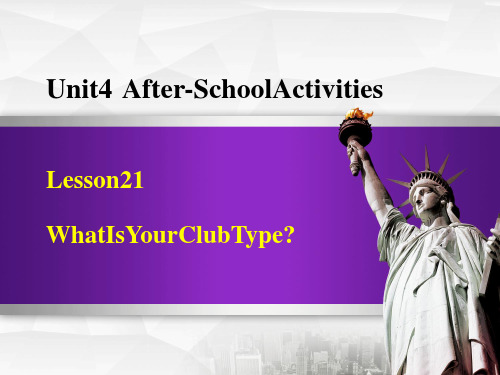
Let'sDoIt!
4) Chooseaclubtypeandmakeanadvertisement
forit.
Example:
SwimmingTeam Doyouwanttobeagood
ArtClub
swimmer?
Doyouliketodrawor JointheSwimmingTeam!
paint?JointheArtClub! Swimmingisgoodexercise
4.Youaregoingonatrip. Butyoucanonlytakeone thingwithyou. Whatdoyoutake? a.Runningshoes. Ican'tgoanywhere withoutthem. b.Amusicplayer. Ican'tlivewithout❿music. c. Somepaperandapencil. Icandrawapicture ontheway. d.Agoodbook. Iwillbeboredwithoutabook.
典例 Wouldyoumind___o_p_e_n_in_(gopen) thewindow, please? Itistoohothere.
典例 —Alex, wouldyoumind_____B__downthemusic? It’stoonoisy.
—Sorry, Dad. I’lldoitrightaway. [湘潭] A. turnB. turningC. toturn
考点1 which哪一个 eg:Whichcomesfirst, thechickenortheegg? 哪个先出来,是鸡还是鸡蛋?
考向 辨析which与what:
译林版英语七年级上册Unit 4教案
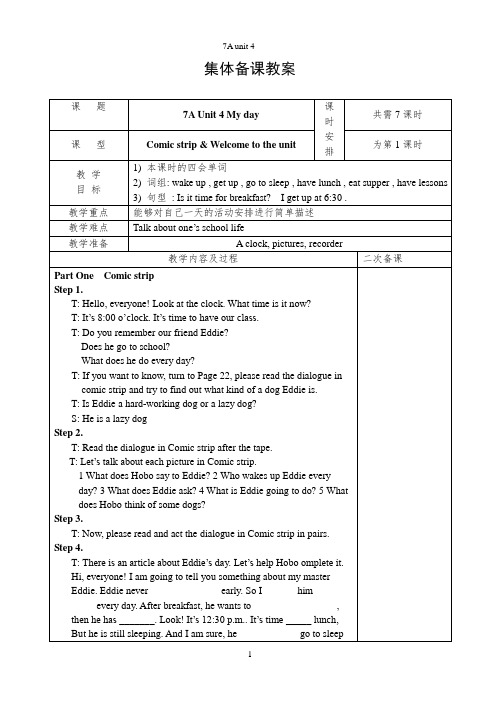
2. Passage 4 To 5
Read them louglythen do TIF question ,e.g.
(1)Millie seldom chats with her friendsafter class.
(2)Millie only goes to the Reading Club On Tuesday.
(3)Millie is a member of the school swimming team.
3. Read the e-mail again and do Ex on p45 B1, P42,B3, step5. post—reading
Do you want to be the best football player in the team?
(The Ss’answer)
Then the teacher say:
I think you shouldpracticehard after school. I wish yousullies.
教学难点
To help the students improve the abilities of listening , speaking reading and writing.
教学准备
Task—based approach
教学内容及过程
二次备课
Step1. warm up
Have a free talk.
2. Have an Interview
Let one of the students act the role of Millie.The other students can ask any question about her school.
英语七年级下册Unit4 After-School Activities
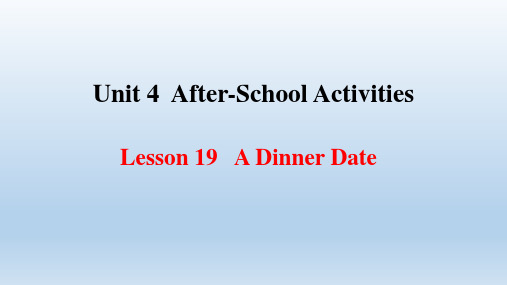
【探究总结】 would like的用法
(1)would like可以缩写为’ d like。其疑问形式 用来表达委婉的建议或请求。
(2)would like sth. = want sth.
意为“想要某物”
wouldXliki’eatond—o stthh. =ewWantatolldeodsthC. ity
—No, they ___B___ went to see a film.
A. all B. both C. either D. every
②There are 11 players in this game. __A____ of
them are boys. A. All B. Both C. Every D. Each
【学以致用】
Our teacher asks us to practice sp__e_a_k_i_ng
(speak) English every day.
4. We’re both busy all week. 我们俩整个星期 都忙。
both adj. & pron. 二者(的)
They are both busy this week.
意为“想要做某事”
(3)Would you like. . . 的肯定答语常用 Yes, please. /
OK. / All right. 等; 其否定答语常用No, thanks.
(4)Would you like to do. . . 的肯定 答语常用Yes/Sure, I’d like/love to. 其 否 定 答 语 常 用 Sorry, I can’t. / I’d like/love to, but. . . 。
新目标八年级英语下册unit4教案
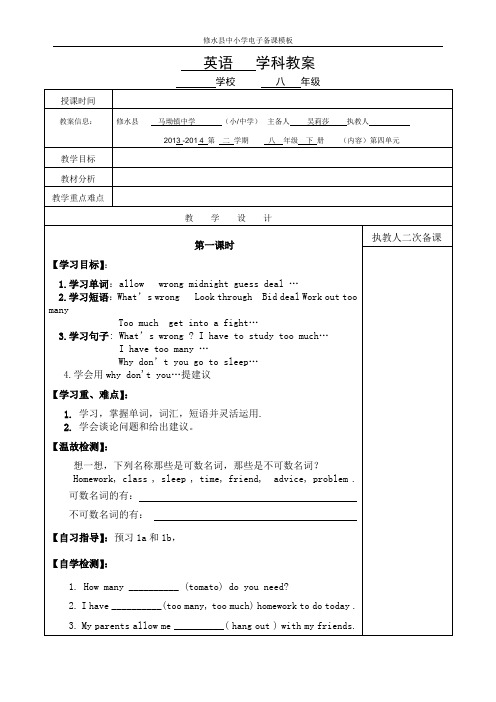
你应该再多等一会儿。
--- I have a very bad cold.我感冒很厉害。
--- You should lie down and have a rest.你应该躺下,多喝水。
【当堂训练】:
一.单选:
( )1.How about ____ calendar?
(5), Let’s do sth…?
(6). What should Ido…?( should表示请求、征询对方意见)
e.g.:What should I get my dad for his birthday?
我该送给爸爸什么作为他的生日礼物呢?
【当堂训练】:
一.汉译英:
1.去睡觉________________2.Get into a fight________
Today my speech topic isLearning to get along with our parents.
These days ,most of us feel it hard to get along with our parents.
___________________________________________________________________________________________________________________________________________________________________________________
(1).be afraid of something害怕
Don't be afraid of the dog.别害怕那只狗。
人教版PEP五年级上册第四单元Part A教学设计
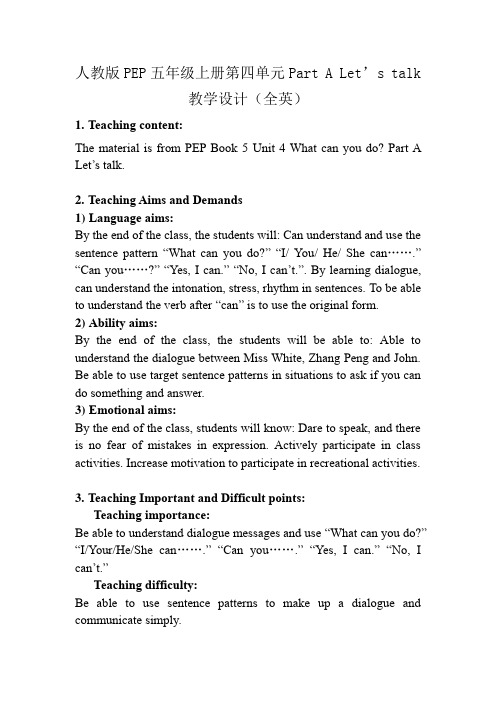
人教版PEP五年级上册第四单元Part A Let’s talk教学设计(全英)1.Teaching content:The material is from PEP Book 5 Unit 4 What can you do? Part A Let’s talk.2.Teaching Aims and Demands1)Language aims:By the end of the class, the students will: Can understand and use the sentence pattern “What can you do?” “I/ You/ He/ She can…….” “Can you……?” “Yes, I can.” “No, I can’t.”. By learning dialogue, can understand the intonation, stress, rhythm in sentences. To be able to understand the verb after “can” is to use the original form.2)Ability aims:By the end of the class, the students will be able to: Able to understand the dialogue between Miss White, Zhang Peng and John. Be able to use target sentence patterns in situations to ask if you can do something and answer.3)Emotional aims:By the end of the class, students will know: Dare to speak, and there is no fear of mistakes in expression. Actively participate in class activities. Increase motivation to participate in recreational activities.3.Teaching Important and Difficult points:Teaching importance:Be able to understand dialogue messages and use “What can you do?” “I/Your/He/She can…….” “Can you…….” “Yes, I can.” “No, I can’t.”Teaching difficulty:Be able to use sentence patterns to make up a dialogue and communicate simply.4.Teaching ProceduresStep 1: PresentationT: Boys and girls, are you interested in stories?Ss: Yes, I am. / No, I am not.T: Alright, let me share a little story with you. Please close your mouth. Watch a video carefully.Ss: Ok.T: And you can try to guess what we are going to learn today.T: Well. The video is over. This is a story about snake and rat. Right? Ss: Yes.T: Smart rat is not eaten by snake, because it runs away from the snake by answering “What can you do?”. All right?Ss: Yes, it is.T: What do you think of rat?Ss: It’s very smart / clever, brave…….T: You are all right. Today, we are going to learn about “What can you do?”.Step 2: ListeningT: Look at the screen, here are two question. We will learn a new dialogue, please listen carefully and choose the answer.Ss: Ok.T: Well, it is very easy. Let’s check the answer. Number one, who can give me an answer?S1: C, he can sing English songs.T: Yes, you are right. Number two, ok, you.S2: …….Step 3: Read togetherT: Ok, boys and girls, let’s listen the recording again, and read it by yourself. Ok?Ss: Ok.T: Well, let’s role-play together. The first group read Zhang Peng’s part, the second group read John’s part, and the third group, the fourth group read Miss White’s part. Understand?Ss: Yes.T: We will have an English party next Tuesday. The third and fourth group, read together.Ss:…….Step 4: Look and sayT: Boys and girls, let’s look at these sentences, these verbs are all original after “can”. For example, “can swim” and “can sing English songs”, right?Ss: Yes!T: Therefore, we can know that the words after “can” are all using the original form. We need to remember this one. Please write it down in a notebook.Ss: Ok, I got it.T: So, each student has a conversation with your partner. I will give you five minutes. Who wants to try, who gets a little red flower! Let’s begin.T: Uh-huh. Which group is willing to say? And the other students need to write down what they say! I will ask you questions later.S1 and S2:………….T: Well down. Which student would try to retell what they said?S3: I can. ……T: Very good. Please sit down. And the whole class, let’s retell together.T/ Ss: …….Step 5: Play a gameT: Next, let's play a little game. The name is Drumming and Passing the Flowers. Now I have a hat. When the music stars, you start moving down. When the music stops, the classmate holding the hathas to stand up and communicate with me. Understand?Ss: Ok.T: Stop! You, stand up. What can you do?S4: I can …….T: Oh, yeah. One more time.T: Stop! Ok, stand up, please. Can you ……S5:…….Step 6: HomeworkT: Ok, this is our homework. You need to fill in these blanks based on the picture. For example, what can he do? He can draw pictures. Understand?Ss: Yes.。
冀教版七年级下册英语精品教学课件 Unit 4 After-School Lesson 20
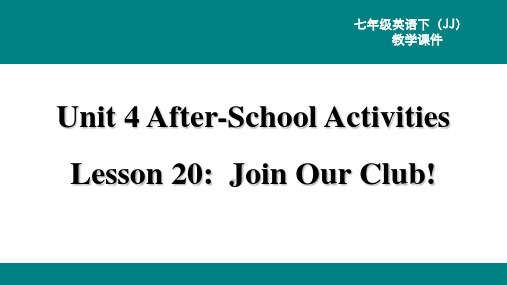
Acting Group Acting is fun and useful. You can meet lots of new people and
improve your social skills. We do lots of role play games in our classes. Everyone can enjoy acting. Join our club and be a star! We meet at
join sb. in 加入到某人当中一起做某事 (doing) sth.
【例句】
That actor often joins in different activities in Beijing. 那位演员经常在北京参加不同的活动。 I will take part in the long jump in this sports meeting. 本届运动会我将参加跳远比赛。 Why don’t you join us? 你为什么不加入我们呢?
shape level pool
n. 样子;形状 n. 水平;标准;质量 n. 小池;水塘
Which club do you want to join? Why?
Chess Club
Acting Group
Swim Team
Do you go to any clubs or after school classes in your spare time? If yes, do you like it / them?
the school theatre every Monday, Wednesday and Friday. Hope to see you there!
人教英语精通版六年级上册_(部优)Unit4_Lesson23_名师教案【新疆昌吉】

人教版(精通)小学英语六上Unit4 January is the first month.Lesson23 教学设计新疆昌吉州实验小学郁春玲本课在单元教学中的地位:本单元的主题是January is the first month. 本课是这个单元的第五课,顺延前四课的内容继续学习有关月份的相关知识,继续学习序数词的用法和五、六月份的主要节日和相关活动。
在本单元前四课已经出现了January is the first month of the year.和介绍节日的相关活动,因此,学生已经能够理解序数词的用法,并能用序数词表达具体的日期。
所以,我将教学目标设定为学生不仅能够理解、运用May is the fifth month of the year. June is the sixth month of the year.并且进一步挖掘这两个月的主要节日相关的活动,并且通过Father’s Day和Mother’s Day活动的挖掘对学生进行情感教育,学生通过设计的闯关任务解决问题,同时体验成功的快乐。
教学目标1. 知识目标:a. 能够听、说、认读以下单词和句子May, June, the fifth month of the year, the sixth month of the year, Labour Day, May Day, Mother’s Day, gift, Children’s Day, Father’s Day等。
b. 能够听、说、读、写以下句子:May is the fifth month of the year. June is the sixth month of the year.2. 能力目标:a. 学生能够在PPT设置的闯关任务的引导下正确描述有关May和June的句子、节日及由节日进一步延伸出的活动。
b. 学生能够灵活运用所学语句进行交流,把5-6月的节日情况及相关活动进行具体描述。
英语作文初二四单元afterclass
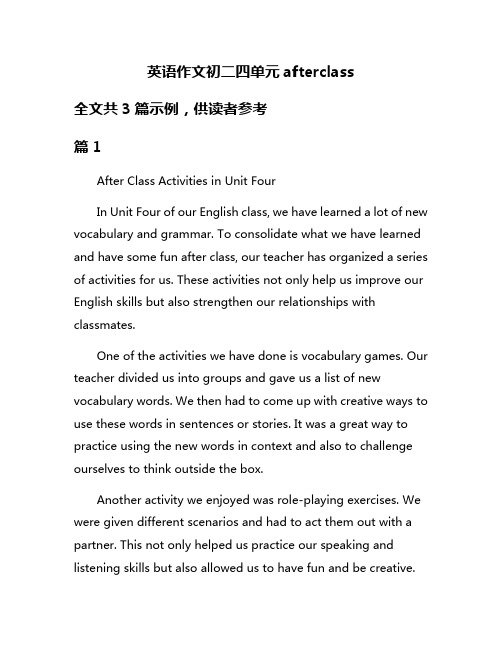
英语作文初二四单元afterclass全文共3篇示例,供读者参考篇1After Class Activities in Unit FourIn Unit Four of our English class, we have learned a lot of new vocabulary and grammar. To consolidate what we have learned and have some fun after class, our teacher has organized a series of activities for us. These activities not only help us improve our English skills but also strengthen our relationships with classmates.One of the activities we have done is vocabulary games. Our teacher divided us into groups and gave us a list of new vocabulary words. We then had to come up with creative ways to use these words in sentences or stories. It was a great way to practice using the new words in context and also to challenge ourselves to think outside the box.Another activity we enjoyed was role-playing exercises. We were given different scenarios and had to act them out with a partner. This not only helped us practice our speaking and listening skills but also allowed us to have fun and be creative.We had scenarios like ordering food in a restaurant, asking for directions, and even negotiating with a shopkeeper. It was a great way to apply what we had learned in class to real-life situations.We also had a spelling bee competition, where we had to spell out words from the unit correctly. This helped us improve our spelling and pronunciation skills while also fostering a sense of healthy competition among us. We cheered each other on and congratulated the winners, creating a positive and supportive learning environment.In addition to these structured activities, our teacher also encourages us to practice our English outside of the classroom. We have language exchange partners from other schools who we can communicate with through emails or video calls. This has been a great way to improve our speaking and listening skills and also learn about different cultures and perspectives.Overall, the after-class activities in Unit Four have been a fantastic way to enhance our English learning experience. They have not only helped us review and practice what we have learned in class but also fostered a sense of camaraderie and cooperation among us. We look forward to more fun and engaging activities in the future units!篇2After Class ActivitiesAfter class activities are an important part of a student's life, especially for middle school students. These activities not only provide a break from the monotony of school work but also help in developing various skills and talents. In this article, we will explore the different types of after class activities that are popular among middle school students and the benefits that they offer.One of the most popular after class activities is sports. Many middle school students participate in various sports such as basketball, football, volleyball, and swimming. Sports not only help in improving physical fitness but also teach important life skills such as teamwork, discipline, and perseverance. Playing sports also helps in relieving stress and improving mood, which can be beneficial for students who may feel overwhelmed with school work.Another popular after class activity is music and dance. Many middle school students participate in music clubs, bands, or dance groups. Learning to play a musical instrument or dance not only helps in developing creativity but also improvesmemory and concentration. Music and dance can also be a great way to express emotions and relieve stress. Being part of a music or dance group also helps in building confidence and social skills.Some students prefer to participate in academic clubs or competitions after class. This includes activities such as debate clubs, science fairs, math competitions, and spelling bees. These activities help in improving critical thinking skills,problem-solving abilities, and knowledge in various subjects. Participating in academic clubs can also boost a student's confidence and self-esteem. Winning competitions can be a great achievement and can motivate students to work harder in their studies.Apart from sports, music, dance, and academic clubs, there are also other after class activities that middle school students can participate in such as art and craft classes, drama clubs, scouting, and community service projects. These activities help in developing creativity, leadership skills, and empathy. Students who participate in these activities often find a sense of purpose and satisfaction in serving others and giving back to the community.In conclusion, after class activities play an important role in the overall development of middle school students. These activities not only provide a break from academic work but also help in developing various skills and talents. Whether it is sports, music, academic clubs, or community service projects, there is something for every student to explore and excel in. It is important for students to balance their academic work with after class activities to lead a well-rounded and fulfilling life.篇3After School Activities at Junior High SchoolAfter a long day of classes at junior high school, many students look forward to participating in after school activities. These activities provide students with the opportunity to socialize with their classmates, develop new skills, and relax after a day of studying. At our school, there are a wide variety of options for students to choose from, ranging from sports teams to academic clubs to artistic pursuits.One popular after school activity at our school is the soccer team. The team practices several times a week and competes in games against other schools. Joining the soccer team is a great way for students to stay active and build teamwork skills. Manystudents also enjoy participating in the school's art club, where they can express their creativity through drawing, painting, and other artistic activities. The art club meets once a week and often collaborates on projects to decorate the school.For students who are interested in academics, there are also several options for after school activities. The math club meets regularly to work on challenging problems and prepare for math competitions. The science club conducts experiments and learns about different scientific concepts. These clubs offer students the opportunity to delve deeper into subjects that they are passionate about and to connect with other students who share their interests.In addition to these structured activities, many students choose to spend their afternoons studying in the school library or working on homework in the computer lab. These quiet spaces provide a productive environment for students to focus on their assignments and seek help from teachers when needed. Students who are struggling in a particular subject can also attend tutoring sessions after school to receive extra support.Overall, after school activities play an important role in the lives of junior high school students. They offer students the chance to pursue their interests, make new friends, and developimportant skills. Whether it's playing sports, creating art, or studying for a math competition, there is something for everyone to enjoy after the final bell rings. So, the next time you find yourself with some free time after school, consider joining an activity and expanding your horizons. You never know what new passions you might discover!。
- 1、下载文档前请自行甄别文档内容的完整性,平台不提供额外的编辑、内容补充、找答案等附加服务。
- 2、"仅部分预览"的文档,不可在线预览部分如存在完整性等问题,可反馈申请退款(可完整预览的文档不适用该条件!)。
- 3、如文档侵犯您的权益,请联系客服反馈,我们会尽快为您处理(人工客服工作时间:9:00-18:30)。
Unit4ActivitiesafterClass教学设计Teaching design of Unit4 activities after class
Unit4ActivitiesafterClass教学设计
前言:小泰温馨提醒,英语作为在许多国际组织或者会议上都是必需语言,几乎所有学校
选择英语作为其主要或唯一的外语必修课。
英语教学涉及多种专业理论知识,包括语言学、
第二语言习得、词汇学、句法学、文体学、语料库理论、认知心理学等内容。
本教案根据
英语课程标准的要求和针对教学对象是小学生群体的特点,将教学诸要素有序安排,确定
合适的教学方案的设想和计划、并以启迪发展学生智力为根本目的。
便于学习和使用,本
文下载后内容可随意修改调整及打印。
unit 4 activities after classlesson 7teaching aims:knowledge aim:enable the ss to grasp the
words :basketball,football,ping-
pong,sport,pass,catch,shot.the sentences:what are they doing?they’re doing sth.ability aim:can talk about the activities and the favorite sport with the simple aim:educative the ss to do exercise every day.main
points:foster the ss’ asking and answering
abilities.difficult points:talk about the activities and
the favorite sport materials: tape recorder, pictures, steps :
step 1 warm-up/ review
1.daily greeting:t: good morning ,class. nice to see
you again.”ss: good morning , miss chen . nice to see
you ,too.”
2.sing the song: the music room.step 2 leading
1.show the cards and review the words: run,
swim,sing,dance,boat, play, etc . present them and let
the ss listen and repeat.
2.say the rhyme: running,running,i am
running.swimming,swimming,you are
swimming.singing,singing,he is
singing.dancing,dancing,she is
dancing.boating,boating,we’re
boating.playing,playing,we’re playing.step 3
presentation
1.learn to say
1) to learn the new words and sentences t: football,look,i’m playing football. (say and act)ss:playing,playing, playing football. t: what are they doing? ss: they’re playng football.to learn “pass
the ball,catch the ball”,make the ss say and act.
2) play a game----listen and do. the
teacher show the card,let the ss act.
3) listen to the tape first,then read after the tape.step 4 consolidation.
1.ask and answer: what are they doing? they’re….
2.do a survey:what’s your favorite sport?
3.learn to sing: row your boat.step 5 homeworklisten to the tape & repeat and talk them in daily life..finish off the activity book of lesson 7.
-------- Designed By JinTai College ---------。
